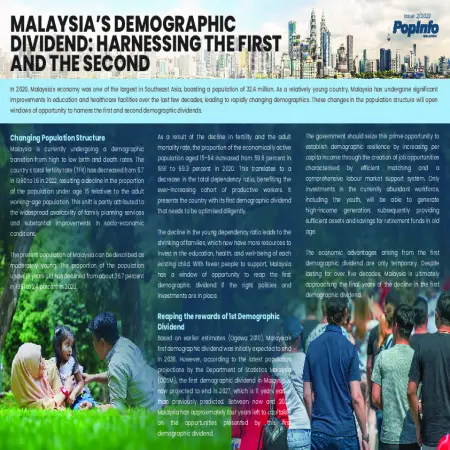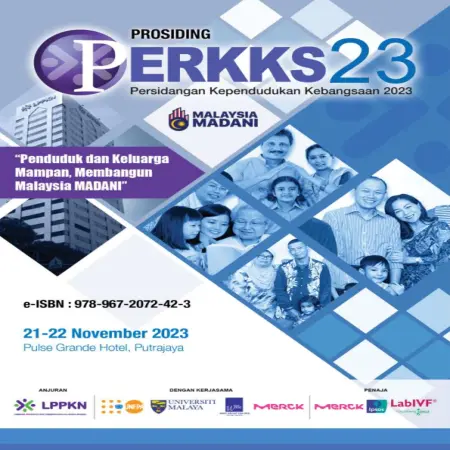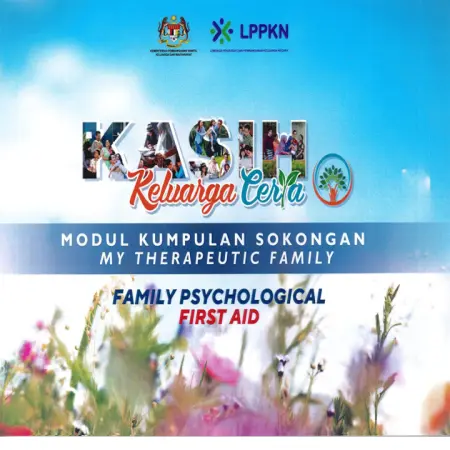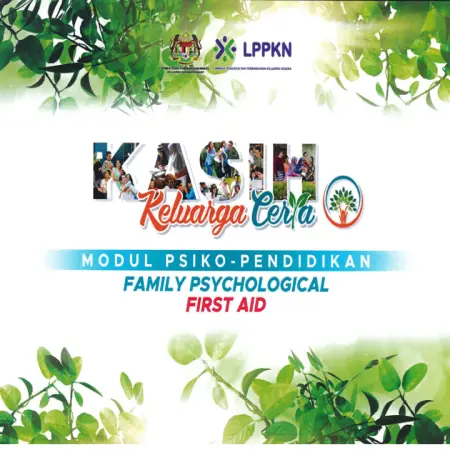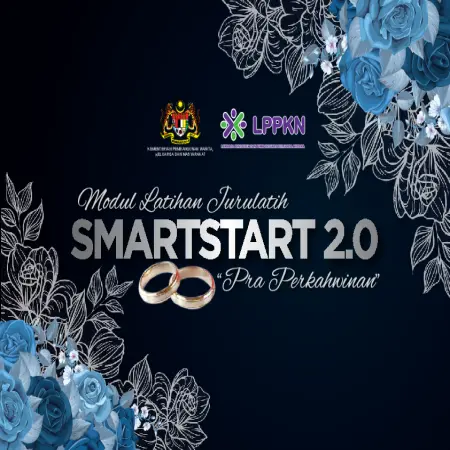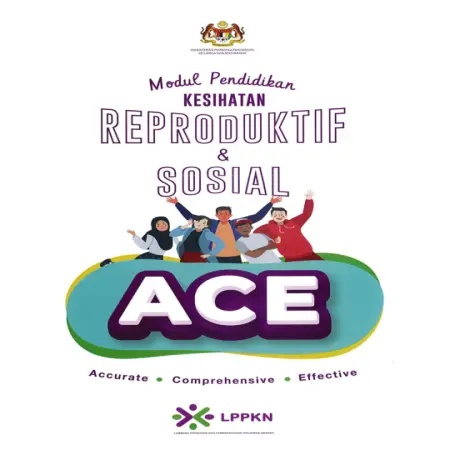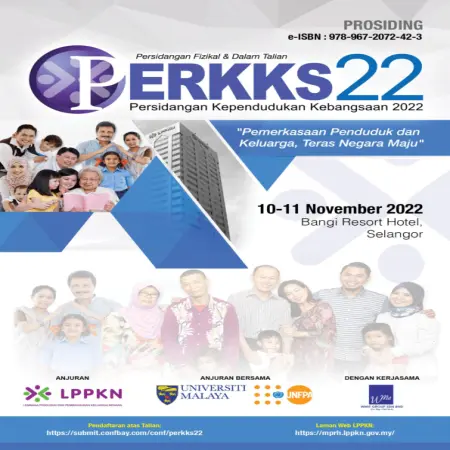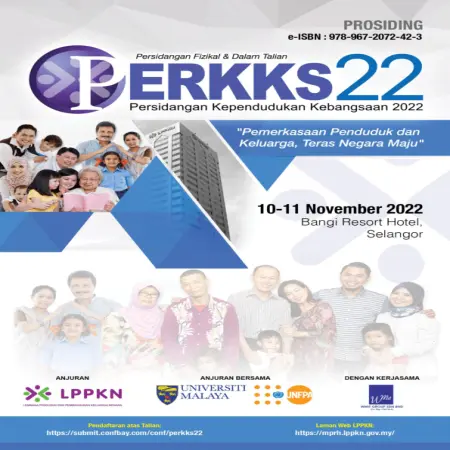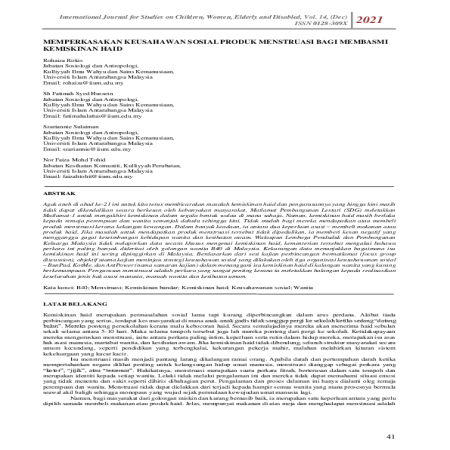Browse by Author
|
|
Malaysia's demographic dividend: harnessing the first and the second
Item Type: Newsletter
Editor:
Year: 00/12/2023
Abstract: In 2020, Malaysia's economy was one of the largest in Southeast Asia, boasting a population of 32.4 million. As a relatively young country, Malaysia has undergone significant improvements in education and healthcare facilities over the last few decades, leading to rapidly changing demographics. These changes in the population structure will open windows of opportunity to harness the first and second demographic dividends.
|
|
|
|
|
|
Melaporkan kualiti tinjauan sistematik amalan bersesuaian pendidikan untuk kanak-kanak bawah dua tahun: Pematuhan mengikut garis panduan Prisma
Item Type: Book Section
Editor:
Year: 00/12/2023
Abstract: The aim of this study was to assess the quality of the reporting of the systematic review of educationally appropriate practices for children under two years of age using the guidelines of the Item Pelaporan Pilihan for Systematic Review and Meta-analysis (PRISMA). Results of searches from Scopus, Web of Science (WoS), and Taylor & Francis online have obtained 42 journal articles of empirical report data that describe the education of children under two tears of age starting in 2019-2023
|
|
|
|
|
|
Modul My Therapeutic Family: Family Psychological First Aid
Item Type: Module
Editor:
Year: 00/01/2023
Abstract: INTRODUCTION:-
KASIH Keluarga Ceria Program is a comprehensive initiative aimed to bolster the family institution in Malaysia, which is a cornerstone of national well-being. This program comprises two modules, namely:
i. Psychoeducation Module
ii. Support Group "My Therapeutic Family" Module
These modules were based on the Family Psychological First Aid (F-PFA) model, jointly developed by NPFDB and Universiti Pendidikan Sultan Idris (UPSI). The model integrated fundamental family dynamics, functional family systems, and Psychological First Aid principles recognized by the World Health Organization (WHO).
The Support Group "My Therapeutic Family" Module complements the Psychoeducation Module by focusing on maintenance, particularly in the post-intervention phase, addressing crisis management within the family unit.
The objectives of this program are:
1. Enhance parents' awareness regarding mental health and adaptive skills;
2. Educate parents with knowledge of Family Psychological First Aid (F-PFA);
3. Empower parents with referral skills for psychological assistance;
4. Establish support groups platform for parents; and
5. Forge intelligent collaborative network between NGOs, agencies, and referral experts.
|
|
|
|
|
|
Modul Psiko-Pendidikan "Family Psychological First Aid"
Item Type: Module
Editor:
Year: 00/01/2023
Abstract: KASIH Keluarga Ceria Program is a comprehensive initiative aimed to bolster the family institution in Malaysia, which is a cornerstone of national well-being. This program comprises two modules, namely:
i. Psychoeducation Module
ii. Support Group "My Therapeutic Family" Module
These modules were based on the Family Psychological First Aid (F-PFA) model, jointly developed by LPPKN and Universiti Pendidikan Sultan Idris (UPSI). The model integrates fundamental family dynamics, functional family systems, and Psychological First Aid principles recognized by the World Health Organization (WHO).
The Psychoeducation Module serves to impart knowledge on F-PFA concepts and skills necessary during the preparation and intervention phases of managing crises within the family unit. The module encompasses mental health screening, psychosocial intervention, and referral skill. Families, armed with F-PFA knowledge and skills, gain the capacity to adeptly respond during family crisis.
The objectives of this program are:
1. Enhance parents' awareness regarding mental health and adaptive skills;
2. Educate parents with knowledge of Family Psychological First Aid (F-PFA);
3. Empower parents with referral skills for psychological assistance;
4. Establish support groups platform for parents; and
5. Forge intelligent collaborative network between NGOs, agencies, and referral experts.
|
|
|
|
|
|
Modul Latihan Jurulatih SMARTSTART 2.0 "Pra Perkahwinan"
Item Type: Module
Editor:
Year: 00/01/2022
Abstract: Introduction:-
SMARTSTART 2.0 Pre-Marriage Training the Trainers Trainer Module is a new module that has been processed more neat and organized as a result of creative ideas through the compilation of contents and activities based on observations related to the latest issues that often being the cause of divorce. This module is a standard reference and guideline specially prepared for the use of trainers to facilitate the learning process, teaching and guide the preparation of programme materials. Through this module, it is hoped that it can provide positive benefits especially to individuals or couples who want to get married or who are planning to start a family in order to be more physically, mentally, emotionally, spiritually and financially prepared.
Objectives:
To provide knowledge and skills to the participants about preparations towards marriage.
Program Duration:
2 day program
Target Participants:
Individuals or couples who want/plan to get married.
Interactive Content:
Promising difference through learning and delivery methods. Full involvement of participants through skills training and group activities.
|
|
|
|
|
|
Modul Kasih Keibubapaan Digital
Item Type: Module
Editor:
Year: 00/01/2022
Abstract: Since the country was struck by the Covid-19 pandemic, the new normal has led to increased reliance across all layers of society on devices and the internet for various daily activities such as work, learning, shopping, banking, entertainment, and various other matters. The Internet User Survey (IUS) 2020 by the Malaysian Communications and Multimedia Commission (MCMC) found:
i. Internet users in Malaysia increased to 88.7% in 2020 compared to 87.4% in 2018; and
ii. 50% of internet users spent 5 to 12 hours per day surfing the internet in 2020.
In addition to various potential threats that could target children in the cyber world, the IUS 2020 report found that the level of awareness among parents regarding cyber safety is decreasing. The findings of the report indicate:
i. The level of parental control awareness regarding children's internet usage declined from 62.4% in 2018 to 53.3% in 2020;
ii. 62.5% of parents do not use safety control software for the devices used by their children because they are unaware of such applications; and
iii. On average, parents are unable to specify in detail the safety measures needed to protect their children in the cyber world.
Furthermore, Cyber Security Malaysia's Study on the Standard of Cyber Safety Awareness Among School Students and Parents 2021-2022 revealed that the increase in online activities has led to an increased risk of cyber safety for students. According to the report, internet addiction, lack of digital citizenship awareness, and less effective parental control have contributed to increased cyber safety risks for the younger generation.
Recognizing that digital parenting issues indeed pose challenges and pressures on today's parenting duties, LPPKN has taken the initiative to develop the Digital Parenting KASIH Program using the allocation from the Covid-19 Fund (KWC-19) under the Mental Health Advocacy Initiative of the Ministry of Women, Family, and Community Development in 2022. This program aims to empower parents with the knowledge and skills needed to manage the challenges of children in the current digital generation.
The main objectives of the Digital Parenting KASIH Program are:
i. To instill positive values and ethics in the cyber realm;
ii. To enhance parents' understanding of digital challenges; and
iii. To improve parent’s skills in monitoring children’s usage of digital applications.
|
|
|
|
|
|
Modul Pendidikan Kesihatan Reproduktif dan Sosial ACE (Accurate, Comprehensive, Effective)
Item Type: Module
Editor:
Year: 00/01/2022
Abstract: LPPKN published an intervention module called Module ACE – Accurate, Comprehensive and Effective on 2021 as a product from The Youth Intervention Study: Best Practices for Youth Intervention Programs that was carried out in 2016. This module is suitable to be used for adolescents age 10 to 24 years old.
The ACE module covers comprehensive reproductive health and sexuality education which includes legislation on sexual violence, gender equality and human trafficking. The module has been implemented on targeted groups consist of youths and peer educators, and proven to expand their knowledge on reproductive health. The activities from the module are delivered using pedagogy method that encourage on two-way interaction and responsiveness.
|
|
|
|
|
|
Mothers’ views and their expected roles on parent-adolescent communication on sexual and reproductive health
Item Type: Book Section
Editor:
Year: 00/00/2022
Abstract: As parents generally have more contact than other adults with their children, they are the most suitable people in imparting correct knowledge about sexual and reproductive health (SRH) to their adolescents. However, apart from getting information from parents, adolescents also learn from other parties such as the internet, teachers, or peers. Thus, this study aimed to explore mothers’ views on parent-adolescent communication on SRH and their expected roles in communicating about SRH.
|
|
|
|
|
|
Malaysian youths at risk: a review of mental health and maladaptive behaviors
Item Type: Book Section
Editor:
Year: 00/00/2022
Abstract: The contemporary world with its constant changes and challenges often poses great risks to the mental health of young people who are at the age of learning about themselves and the world they live in. Similarly, recent developments have indicated that Malaysian youths today are greatly affected by mental health issues and are easily driven by maladaptive behaviors.
|
|
|
|
|
|
Memperkasakan keusahawan sosial produk menstruasi bagi membasmi kemiskinan haid
Item Type: Article
Editor:
Year: 00/12/2021
Abstract: The Sustainable Development Goals (SDGs) set Goal-1 to end poverty in all its forms everywhere. However, menstrual poverty still happens to teenage girls and women from the past until now. It is not easy for them to get or buy menstrual products due to financial constraints. Based on a focus group discussion research session, the main objective of the study is to review the social entrepreneurship strategies carried out by three social entrepreneurship organizations – BunPad, KotMe and AntPower (pseudonym of the study) in dealing with the issue of menstrual poverty among underprivileged women.
|
|
|
|





